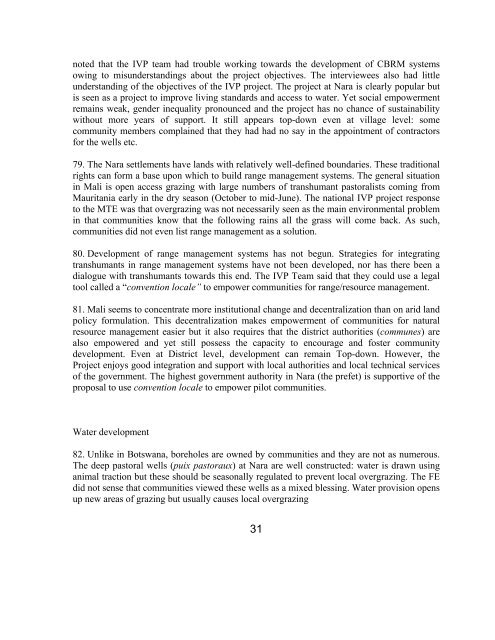Final Evaluation of the - UNEP
Final Evaluation of the - UNEP
Final Evaluation of the - UNEP
Create successful ePaper yourself
Turn your PDF publications into a flip-book with our unique Google optimized e-Paper software.
noted that <strong>the</strong> IVP team had trouble working towards <strong>the</strong> development <strong>of</strong> CBRM systems<br />
owing to misunderstandings about <strong>the</strong> project objectives. The interviewees also had little<br />
understanding <strong>of</strong> <strong>the</strong> objectives <strong>of</strong> <strong>the</strong> IVP project. The project at Nara is clearly popular but<br />
is seen as a project to improve living standards and access to water. Yet social empowerment<br />
remains weak, gender inequality pronounced and <strong>the</strong> project has no chance <strong>of</strong> sustainability<br />
without more years <strong>of</strong> support. It still appears top-down even at village level: some<br />
community members complained that <strong>the</strong>y had had no say in <strong>the</strong> appointment <strong>of</strong> contractors<br />
for <strong>the</strong> wells etc.<br />
79. The Nara settlements have lands with relatively well-defined boundaries. These traditional<br />
rights can form a base upon which to build range management systems. The general situation<br />
in Mali is open access grazing with large numbers <strong>of</strong> transhumant pastoralists coming from<br />
Mauritania early in <strong>the</strong> dry season (October to mid-June). The national IVP project response<br />
to <strong>the</strong> MTE was that overgrazing was not necessarily seen as <strong>the</strong> main environmental problem<br />
in that communities know that <strong>the</strong> following rains all <strong>the</strong> grass will come back. As such,<br />
communities did not even list range management as a solution.<br />
80. Development <strong>of</strong> range management systems has not begun. Strategies for integrating<br />
transhumants in range management systems have not been developed, nor has <strong>the</strong>re been a<br />
dialogue with transhumants towards this end. The IVP Team said that <strong>the</strong>y could use a legal<br />
tool called a “convention locale” to empower communities for range/resource management.<br />
81. Mali seems to concentrate more institutional change and decentralization than on arid land<br />
policy formulation. This decentralization makes empowerment <strong>of</strong> communities for natural<br />
resource management easier but it also requires that <strong>the</strong> district authorities (communes) are<br />
also empowered and yet still possess <strong>the</strong> capacity to encourage and foster community<br />
development. Even at District level, development can remain Top-down. However, <strong>the</strong><br />
Project enjoys good integration and support with local authorities and local technical services<br />
<strong>of</strong> <strong>the</strong> government. The highest government authority in Nara (<strong>the</strong> prefet) is supportive <strong>of</strong> <strong>the</strong><br />
proposal to use convention locale to empower pilot communities.<br />
Water development<br />
82. Unlike in Botswana, boreholes are owned by communities and <strong>the</strong>y are not as numerous.<br />
The deep pastoral wells (puix pastoraux) at Nara are well constructed: water is drawn using<br />
animal traction but <strong>the</strong>se should be seasonally regulated to prevent local overgrazing. The FE<br />
did not sense that communities viewed <strong>the</strong>se wells as a mixed blessing. Water provision opens<br />
up new areas <strong>of</strong> grazing but usually causes local overgrazing<br />
31

















